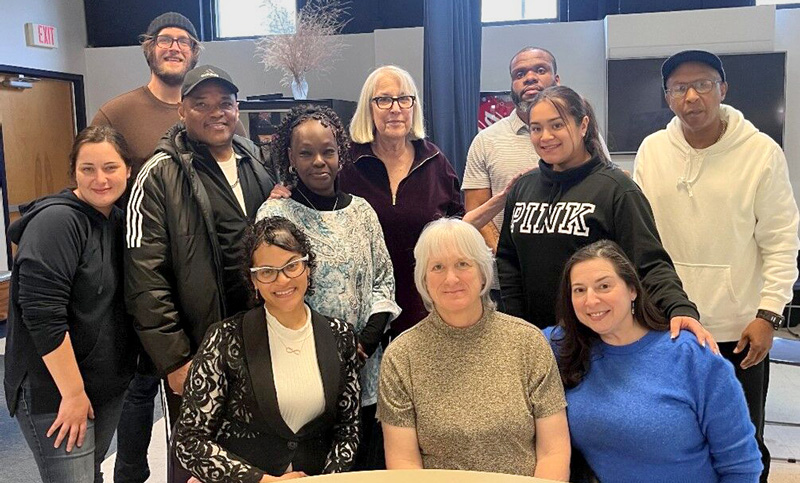For Hands Across Long Island, Inc. (HALI), stigma in healthcare is personal. As a peer-run organization, our mental health recovery “lived expertise” informs our services, which all address structural stigma or population-level disparities experienced by people having psychiatric diagnoses and/or a disability and experiencing poverty, isolation, and homelessness.

Overshadowed participants, filmmaker Lucy Winer, and HALI staff after “wrapping” on film day #1
Another disparity our community faces is one life and death. People with certain psychiatric diagnoses have an average lifespan of 25 years shorter than the general population, primarily based on higher rates of metabolic, respiratory, and cardiovascular disease. (Parks et al., 2006). The causal factors are complex, but research shows one contributing factor is stigma experienced within the healthcare system. Troubling experiences occurring in the literature range from microaggressions to an over-emphasis on “stability” over wellness to the potentially life-threatening phenomenon of diagnostic overshadowing, where reported physical symptoms are incorrectly attributed to a psychiatric diagnosis (Melamed et al., 2019). While disturbing, there is some good news here: stigma is workable. Studies show that “contact-based” interventions, or direct messaging delivered by people with lived experience, are extremely effective at ameliorating stigma (Collins et al., 2012; Corrigan et al., 2014).
This was the origin of HALI’s Overshadowed: Stories of Stigma in the Healthcare System video project, produced in partnership with award-winning documentary filmmaker Lucy Winer (Unlocked, Kings Park: Stories from an American Mental Institution.) Overshadowed started with a series of focus groups with 45 people in various settings: SPA housing community residences, PROS programs, and recovery centers (thanks to our partners Options for Community Living and the Association for Mental Health & Wellness for help with this process.) We asked participants about general experiences with medical care and then about the impact – if any – people thought their psychiatric diagnosis had on the care they had received. We held more formal phone interviews for those interested in sharing more of their stories.
By the end of this process, we had spoken to 45 people. We did not set out to find stories that “villainized” providers, and we are glad to say that many of the people we interviewed happily found medical providers with whom they had a trusted relationship. Other experiences shared were less positive:
- “There have been times when I speak up, and all [doctors] say is ‘oh, we have to increase your meds,’ like my speaking up or being annoyed is a symptom of my mental health, not the reality.”
- “I feel nervous and like they are hurting me with all the medicine. Not everything is explained to me.”
- “I don’t feel comfortable talking about [mental health] with my doctor; I feel like they judge or don’t get it.”
- “They treat us with “kid gloves” when we have mental illness.”
- “Just because they haven’t heard of or experienced what we are going through before doesn’t mean it isn’t real. I feel belittled and like they think I am lying.”
- “[When I have concerns about my physical health], I start getting paranoid. When these issues come up is when I start to hear and see things that are not supportive.”
- “When you tell them about your mental illness, just like everyone else, they don’t understand. He feels like it is impossible to hear or see hallucinations. He is a great doctor, but he just doesn’t understand.”
- “I don’t want to tell my doctor [about my mental health] because she will be scared of me.”
- “It makes me upset when they repeatedly ask if I am on drugs or what medications I am on.”
Eight participants agreed to share parts of their stories on camera. HALI gathered with Lucy and her crew (the original Kings Park cinematographer, sound engineer, and editor!) at our Recovery Center in Central Islip. The resulting videos show in equal measure what interviewees describe as quality care and what they would like to see change.
Our goal was to present the videos to medical professionals and assess any difference in their thinking about the stigma people might experience in their care. We presented to 3 of Long Island’s Federally Qualified Health Centers (FQHCs) that provide integrated care in underserved areas: Harmony Healthcare and Charles Evans Center in Nassau County, and Sun River Health in Suffolk.
Upon watching the videos, audience members – with roles ranging from medical directors to nurses to dentists – engaged in a lively dialogue. One professional talked about being “moved to tears.” Another discussed the challenges of providing person-centered care “within a 15-minute appointment.” Several mentioned the need for “all medical professionals” to experience Overshadowed, particularly staff in emergency depts and especially medical students just beginning their careers.
HALI then had the privilege of presenting to medical students at Hofstra University/Zucker Hospital School of Medicine. One participant shared how glad he was to see the project so early on in his career. The Zucker Hillside Director of Undergraduate Medical Education, Timothy R. Kreider, MD, PhD, shared:
Overshadowed is a powerful workshop with compelling videos showing how our healthcare system can sometimes poorly serve patients who have mental health diagnoses. I wish all healthcare professionals could learn from this moving project about how to take better care of some of our most vulnerable patients.
HALI measured the overall effectiveness of the Overshadowed presentation through a short pre- and post-survey for the medical professionals asking whether and how a patient’s mental health status might affect their care experience and the professional’s provision of care. After presenting the videos to 39 medical professionals, we received 38 completed surveys to compare. We were not sure how impactful a 45-minute presentation could be, but we were surprisingly pleased:
- While there was some uncertainty beforehand about how a psychiatric diagnosis might impact comfort-seeking medical care, afterward, everyone agreed.
- All respondents showed an increased awareness of stigma.
- All participants agreed or strongly agreed that hearing the stories in Overshadowed helped them better understand how people experience the impact of stigma in healthcare.
- We also saw some increase in medical professionals saying they could think of examples where focusing on a mental health condition resulted in medical issues or necessary treatment being overlooked.
Moving forward, HALI wants to increase the scalability of the Overshadowed project by creating a stand-alone short educational film that is available for download. We are especially interested in increasing our reach to staff at hospitals, where diagnostic overshadowing is most documented, and to medical students, where we have an early opportunity for education. HALI is also interested in producing additional content that will amplify our community’s voice by collecting more stories from people who are not engaged in care at all, including unsheltered people.
Hands Across Long Island, Inc. (HALI) has provided peer support services since 1988 and is the largest employer of peer professionals on Long Island. We serve people with mental health, co-occurring, and trauma-related life challenges through non-clinical services, including advocacy, supportive housing, employment support, wellness coaching, and community bridging from hospitals and prisons. For more information, contact support@hali88.org.
This project was funded by the New York State Office of Mental Health and the New York State Tax Check-off Funds for Mental Health Stigma Reduction.
References
Collins, R., Wong, E., Cerully, J., Schultz, D., & Eberhart, N. (2012). Interventions to reduce mental health stigma and discrimination: A literature review to guide evaluation of California’s mental health prevention and early intervention initiative.
Corrigan, P. W., Michaels, P. J., Vega, E., Gause, M., Larson, J., Krzyzanowski, R., & Botcheva, L. (2014). Key ingredients to contact-based stigma change: A cross-validation. Psychiatric Rehabilitation Journal, 37(1), 62-64
Melamed, O. C., Fernando, I., Soklaridis, S., Hahn, M. K., LeMessurier, K. W., & Taylor, V. H. (2019). Understanding engagement with a physical health service: a qualitative study of patients with severe mental illness. The Canadian Journal of Psychiatry, 64(12), 872-880.
Parks, J., Svendsen, D., Singer, P., Foti, M. E., & Mauer, B. (2006). Morbidity and mortality in people with serious mental illness. Alexandria, VA: National Association of State Mental Health Program Directors (NASMHPD) Medical Directors Council, 25(4), 1-87.








